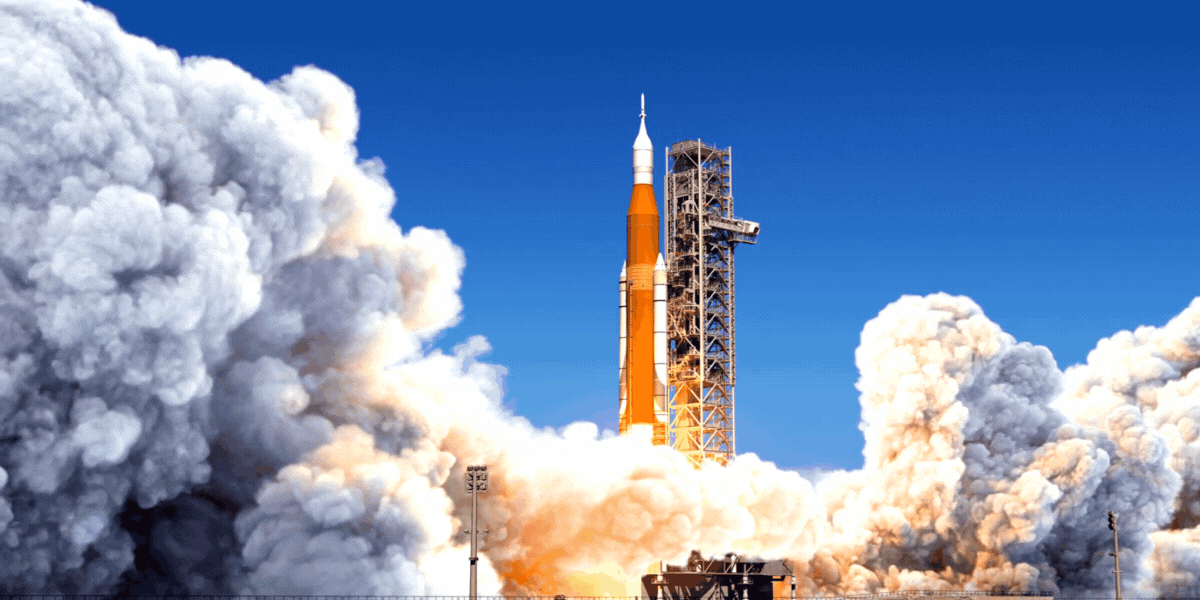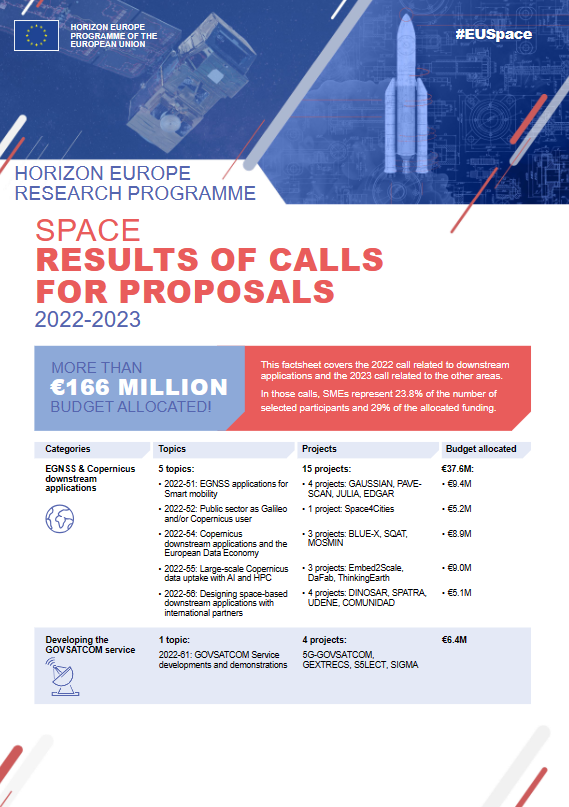|
Brussels, |
|
Exploring the EU Space Strategy
Europe and the United States must reshape the landscape of space exploration and technological progress, as they now have new competitors on the horizon: The space programs of Russia, India and China prepare for intense future competition. EU Commission released the results of Horizon Europe 2022-2023.
The European Union's space strategy has evolved significantly over the years, reflecting the region's commitment to harnessing the potential of space for the benefit of its citizens and industries. In an era where space activities have transcended national boundaries, the EU has recognized the importance of an integrated and cohesive approach to space, not only to maintain its competitiveness but also to contribute to global advancements in space technology and science.
BY Johan GILL
Brussels, 23 October 2023 - 5 MINUTES READ
EU and USA Face Global Competition in Space. In the ever-expanding domain of space exploration and technology, the European Union (EU) and the United States find themselves firmly at the forefront of global competition. Their collective efforts and strategic initiatives are charting the course of future space activities, but they are not alone in this endeavor. Emerging space programs from nations such as China, India, Brasil and Russia are redrawing the global landscape, ushering in a new era of space exploration.
The race for supremacy in space is no longer confined to a Cold War-era standoff; instead, it has taken on new dimensions in the 21st century. In recent years, the global space landscape has transformed dramatically. The emergence of Asian powers, especially China and India, has introduced an intense dimension of competition that Europe and the United States can no longer ignore.
These emerging space programs have set ambitious goals and achieved remarkable milestones.
China's space agency, the China National Space Administration (CNSA), has landed missions on the Moon, Mars, and beyond, alongside the development of its independent satellite navigation system,
Beidou. India's Indian Space Research Organisation (ISRO) has gained global recognition with missions like the Mars Orbiter Mission (Mangalyaan) and the Chandrayaan Moon missions, positioning itself as a key player in the field.
The Russian Space Agency, Roscosmos, actively participates in space partnerships with Europe and the USA, pursuing its space exploration goals, including lunar lander missions. The Brazilian's Space Agency was developing a new family of launch vehicles in cooperation with the Russian Federal Space Agency. The five rockets of the Southern Cross family will be based on Russia's Angara vehicle and liquid-propellant engines.
So, the pioneering era of space exploration is coming to an end. Research, commercial, and military spaces are now shared by many countries. International cooperation is important and essential for some projects. For many others, there are distinct national interests, both economic and strategic. Europe faces yet another challenge, and if it sets common and ambitious goals, it can compete at a high level.
The race for supremacy in space is no longer confined to a Cold War-era standoff; instead, it has taken on new dimensions in the 21st century. In recent years, the global space landscape has transformed dramatically. The emergence of Asian powers, especially China and India, has introduced an intense dimension of competition that Europe and the United States can no longer ignore.
These emerging space programs have set ambitious goals and achieved remarkable milestones.
China's space agency, the China National Space Administration (CNSA), has landed missions on the Moon, Mars, and beyond, alongside the development of its independent satellite navigation system,
Beidou. India's Indian Space Research Organisation (ISRO) has gained global recognition with missions like the Mars Orbiter Mission (Mangalyaan) and the Chandrayaan Moon missions, positioning itself as a key player in the field.
The Russian Space Agency, Roscosmos, actively participates in space partnerships with Europe and the USA, pursuing its space exploration goals, including lunar lander missions. The Brazilian's Space Agency was developing a new family of launch vehicles in cooperation with the Russian Federal Space Agency. The five rockets of the Southern Cross family will be based on Russia's Angara vehicle and liquid-propellant engines.
So, the pioneering era of space exploration is coming to an end. Research, commercial, and military spaces are now shared by many countries. International cooperation is important and essential for some projects. For many others, there are distinct national interests, both economic and strategic. Europe faces yet another challenge, and if it sets common and ambitious goals, it can compete at a high level.
Let's see how Europe seeks to establish a common policy and strategy.
The Role of the European Space Agency (ESA)
At the heart of Europe's endeavors in space is the European Space Agency (ESA).
ESA plays a pivotal role in shaping Europe's presence in space. Established in 1975, ESA is an intergovernmental organization that brings together 22 member states, and its mission revolves around developing and coordinating space programs that benefit its member states and foster collaboration with other space agencies worldwide, like NASA.
ESA's activities span a wide spectrum, from Earth observation and Planetary exploration to human spaceflight and space technology development. Its role in Earth observation has resulted in the Copernicus program, which provides crucial data for environmental monitoring, disaster management, and security. Through missions like Rosetta, which explored a comet, and the ongoing ExoMars mission to Mars, ESA contributes to humanity's understanding of our Solar system.
One of ESA's notable contributions is its participation in international space missions and collaboration with agencies like NASA, Roscosmos, and others.
ESA has been an active partner in projects such as the International Space Station (ISS), where European astronauts contribute to space science and technology research.
ESA plays a pivotal role in shaping Europe's presence in space. Established in 1975, ESA is an intergovernmental organization that brings together 22 member states, and its mission revolves around developing and coordinating space programs that benefit its member states and foster collaboration with other space agencies worldwide, like NASA.
ESA's activities span a wide spectrum, from Earth observation and Planetary exploration to human spaceflight and space technology development. Its role in Earth observation has resulted in the Copernicus program, which provides crucial data for environmental monitoring, disaster management, and security. Through missions like Rosetta, which explored a comet, and the ongoing ExoMars mission to Mars, ESA contributes to humanity's understanding of our Solar system.
One of ESA's notable contributions is its participation in international space missions and collaboration with agencies like NASA, Roscosmos, and others.
ESA has been an active partner in projects such as the International Space Station (ISS), where European astronauts contribute to space science and technology research.
EU Activities in Space and the Role of EUSPA
|
With €15,2 billion to finance space activities during the 2021-2027 period, EU and its agencies develop severalr projects. One key player is the European Union Agency for the Space Programme (EUSPA).
EUSPA's mission is to provide positioning, navigation, and synchronization based on Galileo and EGNOS, cost-effective satellite communication services through GOVSATCOM, and soon IRIS2, and Front Desk services of the EU Space Surveillance Tracking. In doing so, EUSPA ensures the continuous operation and robustness of these systems, directly contributing to Europe's autonomy and security. The EU, through its Space programs, promotes the development of satellite-based services that benefit European citizens. These services include telecommunications, navigation, Earth observation, and environmental monitoring, which have far-reaching applications in diverse fields, from agriculture and transportation to disaster management and scientific research. As the EU invests in space research, Earth observation, and satellite technology, it enhances its global presence and addresses societal challenges while fostering technological innovation. Read more on Aerospace page and Read more on 2021-2027 Budget for space activities. |
On 8 September 2023, the Commission presented the results of 2022–2023 space-related research calls under Horizon Europe. Click on the leaflet/image above to view the PDF document.
As of October 2023, there are 7 Calls for proposals in Space activity and 3 Tenders open. -> Go to the "EU Industry Platform" for all details
European National Space Agencies and Autonomous Programs
European national space agencies, while part of the broader EU space ecosystem, maintain their autonomy and manage their own space programs. Each national agency is responsible for advancing its country's interests and objectives in space exploration, satellite technology, and space research. These agencies are often aligned with ESA's programs and priorities, but they also pursue independent projects that cater to their national priorities and objectives.
Germany's DLR (German Aerospace Center), France's CNES (National Centre for Space Studies), Italy's ASI (Italian Space Agency), and the UK Space Agency are among the notable national space agencies operating across Europe. These agencies not only contribute to ESA's missions but also independently engage in space research, technology development, and satellite projects.
Germany's DLR (German Aerospace Center), France's CNES (National Centre for Space Studies), Italy's ASI (Italian Space Agency), and the UK Space Agency are among the notable national space agencies operating across Europe. These agencies not only contribute to ESA's missions but also independently engage in space research, technology development, and satellite projects.
Conclusion
In a world where space activities have evolved beyond the boundaries of international politics, the EU and its member states, in collaboration with several third countries, find themselves in the midst of a global competition that encompasses technological advancement, economic growth, and scientific discovery.
As Europe and major third countries actively pursue space exploration and technology, they collectively shape the future of space activities on a global scale. In the process, they inspire the next generation of scientists and engineers, foster international collaboration, and provide valuable contributions to humanity's understanding of the cosmos.
This dynamic interplay between nations continues to drive the evolution of space exploration and technology, ensuring that the possibilities of space remain limitless.
In this context, the EU must think on a larger scale and allocate much more funding to a sector that will also determine leadership in one of the most economically promising industrial fields.
In a world where space activities have evolved beyond the boundaries of international politics, the EU and its member states, in collaboration with several third countries, find themselves in the midst of a global competition that encompasses technological advancement, economic growth, and scientific discovery.
As Europe and major third countries actively pursue space exploration and technology, they collectively shape the future of space activities on a global scale. In the process, they inspire the next generation of scientists and engineers, foster international collaboration, and provide valuable contributions to humanity's understanding of the cosmos.
This dynamic interplay between nations continues to drive the evolution of space exploration and technology, ensuring that the possibilities of space remain limitless.
In this context, the EU must think on a larger scale and allocate much more funding to a sector that will also determine leadership in one of the most economically promising industrial fields.
© Copyright eEuropa Belgium 2020-2023
Source: © European Union, 1995-2023
Source: © European Union, 1995-2023





